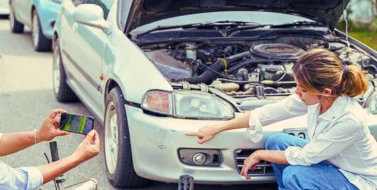After an accident with an uninsured driver, knowing how to file an uninsured motorist claim can help you protect your rights. Even though Illinois mandates automobile insurance, many drivers don’t have sufficient coverage. In an accident involving an uninsured driver, you might need to seek benefits from your own insurance provider. To do so, you will need to have a good grasp of the law, your insurance policy, and the steps to take when handling a situation involving an uninsured driver.

Contact Lloyd Miller Law Group at (773) 838-8100 for assistance with such a claim.
Table of Contents
What Is Uninsured Motorist Coverage?
Auto insurance is a form of financial protection you pay for, covering you in case of damage, loss, or injury. The insurance company pays for the damages if you’re involved in an accident. For example, if you accidentally cause $16,000 worth of damage, having insurance means you won’t have to pay this amount yourself.
There are two types of insurance claims: first-party and third-party. A first-party claim is when you claim with your own insurance company, such as when you’re in an accident and need to claim for repairs. On the other hand, a third-party claim is when you claim the cost of repairs from the at-fault driver’s insurance after an accident he or she caused.
In Illinois, drivers must have a minimum liability insurance of $25,000 for one person and $50,000 for two or more people injured or killed in a car accident, and $20,000 for property damage per accident. Failing to have this mandatory coverage can result in a driver receiving a ticket and fine.
Uninsured Motorist Coverage
In 2022, 14% of drivers in the United States were uninsured. Uninsured motorist coverage safeguards you if you are in an accident with a driver who is at fault and does not have insurance. Its purpose is to ensure that you are in the same position as you would have been if the uninsured driver had liability insurance. Uninsured motorist coverage is a first-party claim, meaning your insurance company provides it, and you file it with them. It covers bodily injury.
Illinois mandates uninsured motorist coverage, and the minimum limits for this coverage are the same as those required for liability insurance. Motorists must have uninsured motorist coverage for a minimum of $20,000 for one person injured per accident, and $50,000 for two or more people injured per accident.
Uninsured coverage is activated when:
- The fault lies with the other driver.
- The other vehicle’s owner or driver is uninsured, or his or her identity is unknown, referred to as a hit-and-run.
Hit-and-Runs
For a hit-and-run incident to be considered as such, there must be physical contact between the injured party or policyholder and the fleeing vehicle, either directly or indirectly.
In addition to uninsured insurance, underinsured motorist coverage is also available. The difference between uninsured and underinsured in an accident is that uninsured coverage will pay you out if the at-fault driver does not carry liability insurance. Underinsured insurance pays the shortfall when the other driver is insured, but his or her liability limits are insufficient to cover the medical bills for anyone injured.
If a hit-and-run driver is found after you’ve filed an uninsured motorist (UM) claim, there are several steps to take. First, notify your insurance company of the driver’s identification. This update could affect your claim, leading to reimbursement of any amounts previously covered under UM.
Next, cooperate fully with your insurer’s investigation and provide new evidence related to the found driver. If the found driver is insured, your insurer might pursue a claim against his or her policy. Keep track of all communications and documentation related to both your UM claim and the found driver’s insurance. Additionally, you may need to consult with a legal professional to understand your rights and ensure you’re not missing any steps in the car insurance claims process. This approach helps streamline your compensation and ensures that you’re fully covered for damages or losses incurred.
Steps to Take After an Accident With an Uninsured Motorist
After an accident, take steps to safeguard your well-being and your opportunity to receive compensation. The following steps can assist you in managing the event’s aftermath:
Remain Calm and Pull Over
Make an effort to move the vehicle to the side of the road or a safe location and keep calm. Feeling panicked during these moments is natural, but staying composed will enable you to accurately evaluate the situation and respond effectively. Moreover, if anyone is injured, it’s crucial to stay put until medical help and law enforcement arrive.
Get Medical Attention
Your top priority should be your health and safety. Seek assistance from emergency responders when they arrive. If you do not require hospitalization, visit a medical professional promptly for a thorough assessment.
A doctor can detect hidden injuries, and the medical documentation will be essential for your insurance claims and future personal injury legal action.
Gather Evidence
To establish a case and determine liability, gathering evidence immediately after and in the days following the accident is essential. Take photographs or videos of the accident scene. If you cannot move around the scene, don’t hesitate to ask for assistance. It’s imperative to document all vehicles involved in the crash, visible damage, your injuries, road conditions, and traffic signs. There are various types of evidence to be collected and organized in a car accident case, and you can obtain this evidence by following these steps:
- When seeking treatment, make sure to gather all medical records, bills, receipts, and other relevant documentation.
- Capture visual evidence of the accident scene, damages, and injuries through pictures or video footage.
- Obtain copies of police reports related to the incident.
- Keep track of bills for property damage, such as receipts for vehicle repairs or replacements for damaged belongings, such as cell phones.
- Write down contact information for witnesses, which could help obtain witness statements through legal support.
This collected evidence will support your claim and hold the at-fault party accountable for the accident.
Exchange Information With Other Drivers
Be sure to collect the names, contact information, insurance details, and vehicle information of all the other drivers in the accident. Having these details is essential for your insurance claim.
Additionally, gather the contact information of any eyewitnesses. Even if you can’t ask them questions at the scene, a car accident lawyer can contact them later to obtain their statement.
Report the Accident
In Illinois, drivers are required to report a crash to the State Police if it results in death, bodily injury, or property damage exceeding $1,500, as long as all the drivers involved are insured. However, if a driver is uninsured, he or she must report a crash if it causes property damage over $500.
After the police arrive at the scene, they will investigate, including taking photos, gathering witness statements, and obtaining crucial information from the drivers. The police will then compile a report, which is a vital piece of evidence in a related insurance claim.
Consult a Car Accident Attorney
Once you have received medical treatment and gathered all possible evidence, it’s advisable to consult with a car accident attorney in Illinois to discuss pursuing a case. An Uninsured and underinsured motorists accidents lawyer can thoroughly examine the details of your accident and establish liability.
If you encounter difficulties obtaining evidence, an attorney can assist you in obtaining crucial evidence for your case, such as obtaining the police report for your accident or seeking expert witnesses to reconstruct the collision.
Ultimately, an attorney can manage the claims and legal procedures on your behalf to improve the likelihood of success in a car accident case, especially in cases involving uninsured drivers. The attorney can identify and assess all damages throughout this process to determine the total settlement amount.
Notify Your Insurance Company
You should contact your insurance company regarding the incident to make an uninsured or underinsured motorist claim. Notifying them promptly is crucial to avoiding delays in the claims process. Provide them with the police report, your version of what happened, and supporting evidence. Your insurer will handle your claim and investigate the accident. During this period, an adjuster might ask for more details about the damage to your vehicle or any injuries you sustained. Direct him or her to your attorney.
Receive a Settlement Offer
Your insurance provider will review your claim and offer a settlement offer. This offer details the amount the insurance company will provide for your losses.
If the settlement offer appears fair and provides appropriate compensation, you may choose to accept it.
Insurance companies generally aim to minimize payouts for uninsured motorist claims. Consequently, they may offer an amount lower than the actual cost of your damages. If you encounter this situation, it’s advisable not to accept the settlement offer without consulting an attorney.
Tips for Filing an Uninsured Motorist Claim With Your Insurance Company
After an accident with an uninsured motorist, there are considerations for making an uninsured motorist claim with your insurance company.
How to Start the Insurance Claim
You begin a claim by informing your own insurance company about the accident. From there, it’s typically a matter of figuring out information about the crash, including the other driver’s insurance status. Your insurance company will help you understand your options if you need to use your uninsured motorist coverage.
Initiating a claim for an uninsured motorist after an accident is generally uncomplicated. The at-fault driver either does or does not have insurance. Your insurance company will open the claim, investigate the accident, request and review your medical records and other evidence, and work to determine the value of your case. This process can take anywhere from a few weeks to six months or more, depending on the severity of your injuries.
How Much You Can Get From an Uninsured Motorist Claim
The amount of compensation available from an uninsured motorist claim depends on your coverage limits, which are usually subject to state law and insurance company policies. In most cases, your uninsured motorist coverage cannot exceed your liability coverage. Therefore, if you have $50,000 in liability coverage, you cannot purchase more than $50,000 in uninsured motorist coverage. This limitation is in place to prevent people from obtaining minimal liability coverage and then maximizing their uninsured/underinsured motorist coverage.
However, with an uninsured motorist claim, you can typically receive compensation for the same types of car accident injuries that you would receive in a liability claim against the at-fault driver. These losses include:
- Reimbursement for medical expenses related to past car accident injuries
- Coverage for future medical costs for treatment of car accident injuries
- Compensation for lost income due to missed work or medical appointments
- Payment for physical and emotional suffering caused by the car accident and injuries
Uninsured motorist coverage typically only applies to injuries resulting from car accidents, and generally cannot be used to cover the cost of repairing or replacing your damaged vehicle. To secure coverage for property damage caused by uninsured motorists, you’ll likely need to obtain a separate “uninsured motorist property damage” insurance policy or a similar option.
You May Need to Negotiate a Fair Settlement
It is often simpler to handle a claim with your own car insurance company after an accident, as opposed to filing a claim with the other driver’s insurer. However, this doesn’t guarantee that your insurance company will promptly pay your claim within the limits of your uninsured motorist coverage, especially if there are uncertainties about the severity and extent of your injuries. It may be necessary to advocate for a fair outcome. You can seek legal advice on how to settle a car insurance claim.
Insurance Claims and Bad Faith
If you file a claim for uninsured motorist coverage, your insurance company will likely investigate your medical treatment, the extent of your injuries, and other relevant details.
All insurance companies are required to handle claims fairly and honestly. If your insurance company adopts an aggressive approach to your claim, or undervalues your claim without engaging in fair negotiation, it may have breached its obligation to handle your claim in good faith. In certain circumstances, mishandling an uninsured or underinsured motorist claim by an insurer can lead to a claim of bad faith against the insurance company. A car accident lawyer can advise you on whether your insurance company is acting in bad faith.
If you have been involved in a car crash with a driver who does not have insurance coverage, it may be wise to consider consulting with a car accident attorney regarding your circumstances. You can contact us at Lloyd Miller Law Group to seek help from a car accident attorney





